


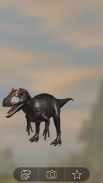
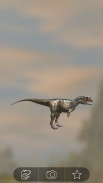
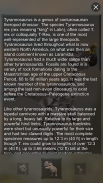
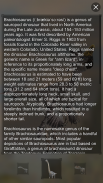
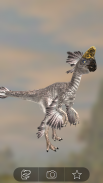
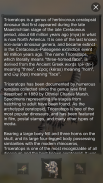
Monster World - Jurassic Dinosaur Encyclopedia

Mô tả của Monster World - Jurassic Dinosaur Encyclopedia
Through this software, you can get close to the dinosaurs and learn about the world of dinosaurs through detailed information.
The Jurassic period (/dʒʊəˈræs.ɪk/; from Jura Mountains) is a geologic period and system that spanned 56 million years from the end of the Triassic Period 201.3 million years ago (Mya) to the beginning of the Cretaceous Period 145 Mya. The Jurassic constitutes the middle period of the Mesozoic Era, also known as the Age of Reptiles. The start of the period was marked by the major Triassic–Jurassic extinction event. Two other extinction events occurred during the period: the Pliensbachian-Toarcian extinction in the Early Jurassic, and the Tithonian event at the end; neither event ranks among the "Big Five" mass extinctions, however.
The Jurassic period is divided into three epochs: Early, Middle, and Late. Similarly, in stratigraphy, the Jurassic is divided into the Lower Jurassic, Middle Jurassic, and Upper Jurassic series of rock formations.
The Jurassic is named after the Jura Mountains within the European Alps, where limestone strata from the period were first identified. By the beginning of the Jurassic, the supercontinent Pangaea had begun rifting into two landmasses: Laurasia to the north, and Gondwana to the south. This created more coastlines and shifted the continental climate from dry to humid, and many of the arid deserts of the Triassic were replaced by lush rainforests.
On land, the fauna transitioned from the Triassic fauna, dominated by both dinosauromorph and crocodylomorph archosaurs, to one dominated by dinosaurs alone. The first birds also appeared during the Jurassic, having evolved from a branch of theropod dinosaurs. Other major events include the appearance of the earliest lizards, and the evolution of therian mammals, including primitive placentals. Crocodilians made the transition from a terrestrial to an aquatic mode of life. The oceans were inhabited by marine reptiles such as ichthyosaurs and plesiosaurs, while pterosaurs were the dominant flying vertebrates.
The chronostratigraphic term "Jurassic" is directly linked to the Jura Mountains, a mountain range mainly following the course of the France–Switzerland border. During a tour of the region in 1795, Alexander von Humboldt recognized the mainly limestone dominated mountain range of the Jura Mountains as a separate formation that had not been included in the established stratigraphic system defined by Abraham Gottlob Werner, and he named it "Jura-Kalkstein" ('Jura limestone') in 1799.
Thirty years later, in 1829, the French naturalist Alexandre Brongniart published a survey on the different terrains that constitute the crust of the Earth. In this book, Brongniart referred to the terrains of the Jura Mountains as terrains jurassiques, thus coining and publishing the term for the first time.
The name "Jura" is derived from the Celtic root *jor via Gaulish *iuris "wooded mountain", which, borrowed into Latin as a place name, evolved into Juria and finally Jura.


























